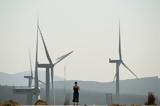Greece’s Green Energy Boom Faces a Harsh Reality Check
What was once seen as the future of Greece’s energy landscape is now approaching saturation, and risks are emerging not only for the energy sector but for the financial system that supports it.
For years, Greece’s green energy
The problem lies in a growing mismatch between supply and demand. While investment in renewables has skyrocketed, actual energy demand in Greece has remained stagnant—and at times, even declined. The country now finds itself with a glut of projects vying to connect to a grid that simply can’t handle them. Greece’s energy transmission and distribution infrastructure has not kept pace with this rapid growth. Without significant upgrades, even fully permitted and technically mature renewable projects are at risk of being sidelined, unable to deliver power to the system.
This grid bottleneck is the "elephant in the room" for Greece’s energy policy. Projects continue to accumulate grid connection terms, but many are unlikely to ever be built.
Meanwhile, some that do exist face increasing curtailments—forced reductions in the amount of electricity they can supply. It’s an outcome that undermines the very rationale for investment in renewables and places growing pressure on a market already strained by inconsistent regulation and a lack of strategic prioritization. Political decisions in recent years have worsened the situation. Without a mechanism to prioritize projects based on technical readiness, network value, or national importance, connection approvals have often been handed out indiscriminately, distorting both grid planning and investment logic.
This evolving crisis is not just an energy issue—it’s a financial one. Greek banks, which have embraced green lending as a path to sustainable growth, now face growing exposure to an overheated market. Renewable energy loans were initially underpinned by predictable revenues and favorable tariffs. But as curtailments rise and grid delays mount, the risk of underperforming or delayed projects grows. If these projects fail to generate expected income, borrowers may struggle to service their debt. In extreme cases, even the collateral—such as a solar park—may prove worthless if it cannot sell its electricity.
Storage projects, seen as a natural complement to renewables, are also under threat. A simultaneous flood of battery installations could erase the price differentials they rely on to remain profitable. Without those margins, revenues collapse, and project viability disappears.
#ENGLISH_EDITION- Δημοφιλέστερες Ειδήσεις Κατηγορίας Ειδήσεις
- Περικλής Κονδυλάτος για Δανάη Μπάρκα: "Θεωρώ ότι το να τα φτιάξεις με τον πρώην μιας φίλης σου είναι ό,τι πιο απαράδεκτο"
- Ο αιφνιδιασμός Μητσοτάκη με τους χάρτες, η αμηχανία στα δεξιά της ΝΔ και το φάλτσο του Χρυσομάλλη
- Γαμπρός ταπεινώνει τη νύφη σπρώχνοντάς τη μέσα στην τούρτα – Έξαλλη η κοινή γνώμη με το έθιμο «cake smash»
- Θεσσαλονίκη: Έθαψε σωλήνα και έριχνε λύματα σε χείμαρρο που φτάνει στο Θερμαϊκό
- Διαβάστε στην Απογευματινή: Ελληνική γαλάζια πατρίδα με σφραγίδα ευρωπαϊκή ο Θαλάσσιος Χωροταξικός Σχεδιασμός - Σημαντικό βήμα που κλείνει εκκρεμότητες ετών
- Οι επιστήμονες βρήκαν ελπιδοφόρες πρώτες ενδείξεις για ύπαρξη ζωής σε μακρινό πλανήτη
- Το viral make up hack για να αποκτήσετε γαλλική μύτη που κάνει τους πλαστικούς χειρουργούς να χάνουν πελάτες
- Εγνατία Οδός: Δύο τραυματίες από το τροχαίο στην σήραγγα Δρίσκου -Κλειστό το ρεύμα προς Ιωάννινα
- Εορταστικό ωράριο Πάσχα: Ανοιχτά τα καταστήματα σήμερα - Η αλλαγή τη Μεγάλη Παρασκευή
- «Πού είναι η μαμά μου;»: Ανατριχιαστικό βίντεο από τη Γάζα την ώρα που οι διασώστες απεγκλωβίζουν κοριτσάκι από τα ερείπια
- Δημοφιλέστερες Ειδήσεις Dikaiologitika
- Μεγάλη Παρασκευή: Τι ώρα αύριο η περιφορά του Επιταφίου
- Πρωτομαγιά: Τι ισχύει με τη μεταφορά της αργίας 2025
- Greece’s Green Energy Boom Faces a Harsh Reality Check
- Το Δημόσιο αξιοποιεί θαλαμηγούς, ελικόπτερα, βίλες, Ferrari και μετρητά
- Κλέαρχος Μαρουσάκης: Μεγάλη Πέμπτη με 30αρια - Έρχεται κακοκαιρία μετά την Ανάσταση
- Τι καιρό θα έχει τη Μεγάλη Παρασκευή την ώρα του Επιταφίου
- NYT: O Τραμπ απέρριψε ισραηλινό σχέδιο για βομβαρδισμούς ιρανικών πυρηνικών εγκαταστάσεων
- Γιατί πρασινίζει ο κρόκος στα κόκκινα αυγά
- Greek Exports at Risk as U.S. Tariff Plans Take Shape
- Ισραήλ: «Ουδέτερη ζώνη» το 30% της Γάζας - Μπλόκο σε κάθε ανθρωπιστική βοήθεια

- Τελευταία Νέα Dikaiologitika
- Greece’s Green Energy Boom Faces a Harsh Reality Check
- Πολύμυλος Κοζάνης: Ο οδηγός του φορτηγού έκανε live στα social media; Τι εξετάζουν οι Αρχές
- Κορυφώνεται η έξοδος των εκδρομέων του Πάσχα - Αυξημένη κίνηση στα λιμάνια
- Greek Exports at Risk as U.S. Tariff Plans Take Shape
- Banking Risks in Albania Carry Greek Relevance
- Greece’s Finance Minister to Share Reform Lessons at IMF Spring Seminar
- Κίνδυνος μπλακάουτ το Πάσχα: Οι τελικές αποφάσεις
- Αποθέωση από τον κόσμο της ΑΕΚ παρά την ήττα (video)
- Greece’s Tax Revenues Grows - So Does Inequality
- Τελευταία Νέα Κατηγορίας Ειδήσεις
- Η Άρσεναλ πήρε το… στέμμα της Ρεάλ και «ονειρεύεται» Champions League! (video)
- Ελεύθεροι επαγγελματίες: Πώς και πότε θα καταργηθεί το τεκμαρτό εισόδημα
- Κτηματολόγιο: Στο metavoles.gr η διόρθωση λαθών και παραλήψεων
- ΟΠΕΚΑ: Η πληρωμή των επιδομάτων και η ευχάριστη αλλαγή
- Αλλάζει επίπεδο στρατηγικής η Κίνα - Πώς απαντά στον δασμολογικό πόλεμο του Τραμπ
- Τι καιρό θα κάνει το Πάσχα
- Μιανμάρ: Απελευθέρωση 4.900 κρατουμένων για το νέο έτος – Άγνωστη η τύχη των πολιτικών κρατουμένων
- Μπιμπίλας – Ευγενίδης: Καβγάς on air
- Ουκρανία: Τρεις νεκροί και 30 τραυματίες σε «μαζική επίθεση» της Ρωσίας στη Ντνίπρο



